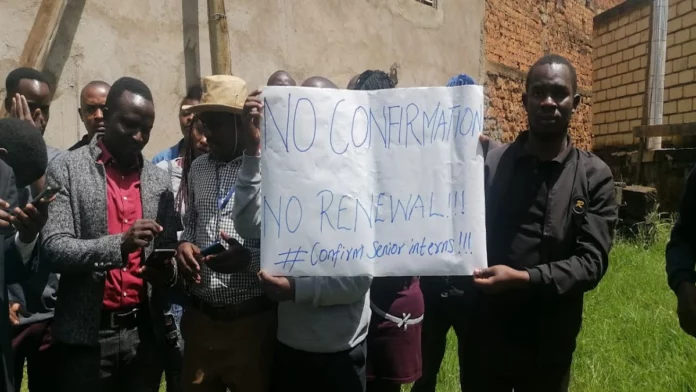The Teachers Service Commission (TSC) has stirred controversy with its recent decision to blacklist intern teachers who declined to renew their internship contracts for a second year. This move has sparked debates and protests among educators across Kenya, particularly those involved in the junior secondary school (JSS) section. As the education landscape evolves and staffing needs grow, it’s crucial to understand the implications of these changes for both current and aspiring teachers.
Quick Summary:
- TSC blacklists intern teachers who declined to renew contracts, triggering re-advertisement of vacancies.
- Intern teachers face challenges securing future teaching opportunities with TSC.
- Policy shift requires teachers to serve a two-year internship before potential permanent employment.
The Internship Dilemma:
The recent decision by the Teachers Service Commission (TSC) to blacklist intern teachers who chose not to renew their contracts has sent ripples across the education sector in Kenya. Many of these interns, predominantly stationed in junior secondary schools, find themselves in a precarious situation as their chances of securing teaching positions with TSC in the future diminish. The Commission’s move to re-advertise vacancies underscores its commitment to enforcing the two-year internship policy, a decision that has met with resistance from some educators.
The Policy Shift and Its Ramifications:
TSC’s insistence on a two-year internship requirement before considering permanent employment has become a point of contention among teachers. While the Commission justifies this policy as a means to address staffing needs and ensure quality education delivery, many interns view it as a barrier to their career advancement. Despite protests and appeals from teacher unions like the Kenya Union of Post Primary Education Teachers (Kuppet), TSC remains steadfast in its stance, citing budgetary constraints as a reason for the extended internship period.
Government Endorsement and Teacher Dissent:
President William Ruto’s recent affirmation of the two-year internship policy has added fuel to the ongoing debate. Ruto’s assurance of eventual permanent employment for interns who fulfill the extended contract has divided opinions within the teaching community. While some welcome the prospect of long-term stability, others question the deviation from the initial one-year non-renewable contract agreement. The disparity between government directives and teachers’ expectations has fueled frustration and discontent among interns, leading to strikes and protests in various regions.
Staffing Challenges and Future Prospects:
Amidst the turmoil surrounding internship policies, the pressing issue of staffing shortages in junior secondary schools looms large. The implementation of the Competency-Based Curriculum (CBC) has exacerbated the demand for qualified educators, with current staffing levels falling short of requirements. TSC acknowledges the need for additional teachers to bridge this gap, signaling plans to recruit 20,000 new educators in the near future. However, the timeline for recruitment remains uncertain, leaving schools grappling with understaffing challenges in the interim.
Final Thoughts:
The evolving landscape of teacher recruitment and internship policies in Kenya reflects the complex interplay between government directives, institutional priorities, and educator aspirations. As TSC navigates the delicate balance between addressing staffing shortages and respecting teachers’ rights, fostering open dialogue and collaboration becomes imperative. Ultimately, achieving sustainable solutions that prioritize both the needs of educators and the educational ecosystem as a whole is essential for realizing Kenya’s vision of inclusive and quality education for all.
